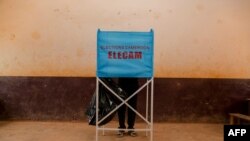Scattered violence marred Cameroon's first election to appoint regional councils on Sunday, with one voter killed by separatist insurgents in the English-speaking Northwest region.
President Paul Biya hopes the vote will appease critics who say he has long neglected the central African country's 10 regions and end a four-year separatist insurgency in the west, which has become the greatest threat to his nearly 40-year rule.
Opponents say the vote offers only the semblance of regional autonomy. Officials voting in the election are overwhelmingly Biya supporters and will help enforce his will on the regions, they say.
"It is not because we will have regional delegates that gunshots will stop and everything will be all right," said Cameroonian political analyst Stephane Akoa.
Separatist fighters had vowed to disrupt the vote and arrest anyone who took part in the Northwest and Southwest, the only regions where English is spoken instead of the official French language.
The fighters killed one regional official who voted outside the town of Bamenda in the Northwest, said one separatist leader, Cho Ayaba.
Elsewhere, gunmen opened fire and wounded a priest and a seminarian driving to Mass in the village of Akum in the Northwest region, said Tatah Mbuy, a spokesman for the Catholic Church in Cameroon.
Ayaba denied involvement in that attack.
The minister of territorial administration, Paul Atanga Nji, told journalists that the vote took place with "calm, serenity and transparency."
Local representatives voted to appoint councils in all 10 regions made up of regional delegates and traditional rulers, putting into action a 1996 law that promised decentralized government but was never enacted.
The councils will have a say over development, but they will not be able to alter laws enacted by the National Assembly and the Senate in Yaounde.
The separatist conflict has killed more than 3,000 people and forced 500,000 from their homes. It started in 2016 when police cracked down on peaceful protests in the west by lawyers and teachers demanding they be allowed to work in English.
The movement became radicalized and militias began fighting for the creation of a breakaway state.





